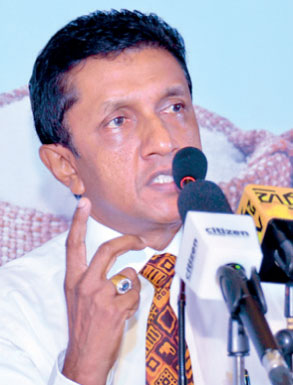Thursday Feb 26, 2026
Thursday Feb 26, 2026
Friday, 9 December 2016 00:49 - - {{hitsCtrl.values.hits}}
 By Charumini de Silva
By Charumini de Silva
Recent detections of cocaine by sugar importers have given a bitter edge to the industry with companies suspending imports from Brazil and seeking Government assistance to check each sack of sugar for drugs, which is threatening to drive up costs.
The Sri Lanka Sugar Importers Association (SLSIA) this week vehemently denied allegations of being complicit in drug smuggling and insisted they were equally startled by the recent discovery of cocaine inside multiple sugar containers.
They also denied any connection whatsoever to the drug world or mafia.
“We firmly state that sugar importers have nothing to do with this cocaine illegally and stealthily inserted by the international drug mafia into the sugar containers rerouted to Sri Lanka,” SLSIA Member (Sugar Trader) Hemaka Fernando told the media on Wednesday.
Noting that there were 11 regular importers that bring in sugar from countries such as Brazil, Thailand, India, Guatemala, Dubai, Europe and Colombia, he explained that almost all companies import sugar from Brazil owing to lower prices.
“The only reason to purchase Brazilian sugar was because the price is cheaper by $ 15 per MT, compared to other origins,” he added.
Sri Lanka’s current local production covers only brown sugar and meets 10% of national demand, which is also seasonal. Therefore 90% is imported, which is over 550,000 MTs per annum. This year already over 11,000 containers of sugar have been imported to Sri Lanka, 70% of which are from Brazil. The country’s requirement per day is around 200 containers, which takes a minimum of seven days to be cleared from the port.
Fernando firmly denied that cocaine could not have been removed by the racketeers at the port of transshipment due to logistical and time constraints.
“The shipments originate from the Port of Santos in Brazil, which is massive and due to that the shipping lines have dedicated terminals, where we assume the mafia adds the cocaine. One reason is that the sugar containers that were discovered by the Police Narcotics Bureau (PNB) in Colombo were unfortunately from one particular top shipping line called ‘MSC’ and secondly the racketeers do not have enough time to unload 200 sacks of sugar or three tiers of sugar stack in a container within a short timeframe of 24 hours during the transshipment,” he explained.
Local importers have already suspended usage of the suspect shipping line and decide not to use the Portugal port as a transshipment port.
“At present we have decided to completely stop imports from Brazil so this eventuality will not arise,” Fernando stressed.
Fernando emphasised that at the time the cargo is loaded to the container by the factory in Brazil no factory officials have any knowledge whatsoever of where the shipment is destined to go.
“The orders are being placed by internationally-renowned trading houses with the manufacturers of sugar in Brazil and when a factory is loading sugar in Brazil they have absolutely no idea to whom it is consigned to as well as which trading company in the world would have purchased this container,” he stated.
When asked why such large cocaine rackets were not discovered in previous years, SLSIA said they used to import mainly from India and other Asian countries, but due to the low production and price factor they started importing from Brazil.
It was pointed out that importers pay around Rs. 20 billion per annum as Customs duty and other levies.
Fernando said all the importers had retained an unblemished record of maintaining high standards and best practices in the sugar business, while significantly contributing to the development of the economy.
Stating that electronic scanners could not detect cocaine in sugar, Fernando stressed that it was humanly impossible for Customs and other Government officials to detect each sugar container.
As a result of the stringent screening process by the officials the importers now have to incur additional costs for demurrage, and handling charges are a minimum of Rs. 5 per kg for every kilo of sugar that has been imported to the country.
“This exercise is not only carried out for sugar that is imported from Brazil, but for all imports,” he noted.
He said there are 510 containers of sugar imported from Brazil at the Colombo port, while another 380 containers are afloat at sea and expected to arrive for Christmas and New Year sales. The sugar that the importers are clearing now were orders placed in July as the transit time from Brazil to Colombo is 45-60 days.
“Under these circumstances, with great hardship, we earnestly appeal to the Government to expedite screening procedures as it has already caused an additional high cost and delays in releasing sugar to our customers,” Fernando said.